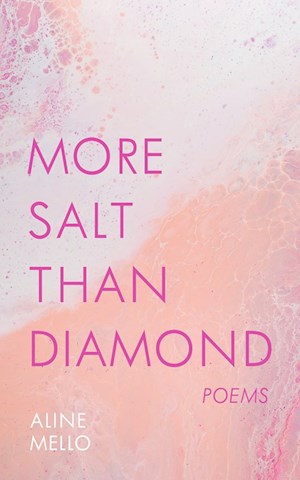More Salt than Diamond,
Reviewed by Padmaja Battani
|
|
In her debut poetry collection More Salt than Diamond, Aline Mello offers an intimate insight into the Brazilian immigrant life. Her poems address otherness, identity, immigration, racism, love as well as eating disorders. These intricate themes flow well unravelling into new dimensions.
The prologue introduces her as a child who imagined she could control the wind. This has kept her believing in more magical happenings. A new immigration bill getting signed is as miraculous as father’s return after leaving. The urge to go back to her home and to connect to her ancestors and to her language is portrayed quite powerfully in the opening poem. Emotion pours through her words when she talks about the president who has referred to immigrants not as people but as animals. The migrants sink into the deep sea to escape ‘from the painful gasp of light,’ an image that represents the relentless worries in the life of illegal immigrants.
The poet candidly ratifies migration as a natural phenomenon. Birds emigrate too - for better weather and for survival. But they return and the same may not be an achievable option for humans who migrate. The twenty-three years spent as an alien migrant seem to be a time un-lived for her. She contemplates that the birds may reject the idea of migration if they are asked to stay in a foreign land for twenty years.
Her poetry also features the theme of bilinguality. Speaking and writing English adeptly is an important aspect for immigrant integration. Despite the fact that English is the only language she writes in, sometimes her thoughts pop out in Portuguese like from a suitcase that came with her. She is unsure whether two languages can live inside one person without bumping into each other. It is quite possible for one language to dominant and make the other frailer, and thus take up the space meant for extended family members.
People who make a new country home have so much to give up, so many things to miss and so many struggles to fight in the process of installing themselves as regular people. Yet it is not uncommon for some of them to avoid this with feeble excuses for their absence. Aline is very realistic about these conflicted feelings in the poem titled ‘Excused Absence’.
She creates her own country inside her and defines its ideal traits. This country has no paper work and is better than the one she left and the one she is in. Every tree has mangoes and every mango is sweet. Moreover, people there greet her in English and do not pause before saying her name.
Poems like ‘The Refugee’ and ‘DACA’ resonate with anguish and hurt felt among illegal immigrants. The vulnerability and helplessness of their situation is displayed subtly in the ‘DACA’:
Another remarkable poem, ‘My Eating Disorder Is a Thin White Woman,’ speaks about fears of gaining weight and dying fat with a double chin and stomach not sucked in. She appreciates the opportunity to turn to another language when tired of conversing in one language in the poem ‘Tired of Speaking English’.
She reaches deep into her roots, not just her country of origin, but her parents, their parents and the ancestors before them. It’s like a meditation on generational suffering, bonds and heartbreaks. ‘Imagine You’re Not Alone’ explores this intensely.
Her mother who used to make dolls now smells like garlic, her hands stained by turmeric. When her daughter asks whether it was worth immigrating, she replies just like any mother who has left her motherland affirming it was not a mistake. And she is one among many who create their homeland in their minds.
Themes of love and passion also become integral fragments of her poems. She confesses that she could never love and that love wants too much and that it’s not worth it. Love is like an enormous volcano erupting and destroying cities while she is like thanking the creeping lava for the views. Love does not make the promise of safety she desires.
Mourning the loss of her culture and bonding with her extended family runs through all of her poetry. The poem ‘Pao De Queijo’ that talks about the making of Brazilian cheese bread also traces the methods her grandmother used to bake it in iron oven and her mother on stones. She portrays herself as more water than oil, more salt than diamonds, than quartz. She prefers being more an essential element than a valuable material. She wants to be a forest of trees and wants to say she is a country, a place for birds to nest. A powerful metaphor depicting the utmost need for home and vital goods. Roots are integral for her life and her poetry reflects it effectively in saying:
Aline’s poetry elegantly captures how the questions about where we come from can take over our life. It’s a portrait of perspective, which holds up a mirror to show that ultimately, we are telling our own stories, and we can choose to see them differently.
Padmaja Battani, originally from India, lives in Connecticut/Ottawa. She received an MA in English Literature. Her prose and poetry appeared in Sierra Poetry Festival, Trouvaille Review, New Pages, Coffee People Magazine, League of Canadian Poets, Black Cat Magazine and others. Her latest passion is hiking. She is currently working on a Poetry Collection.
|


